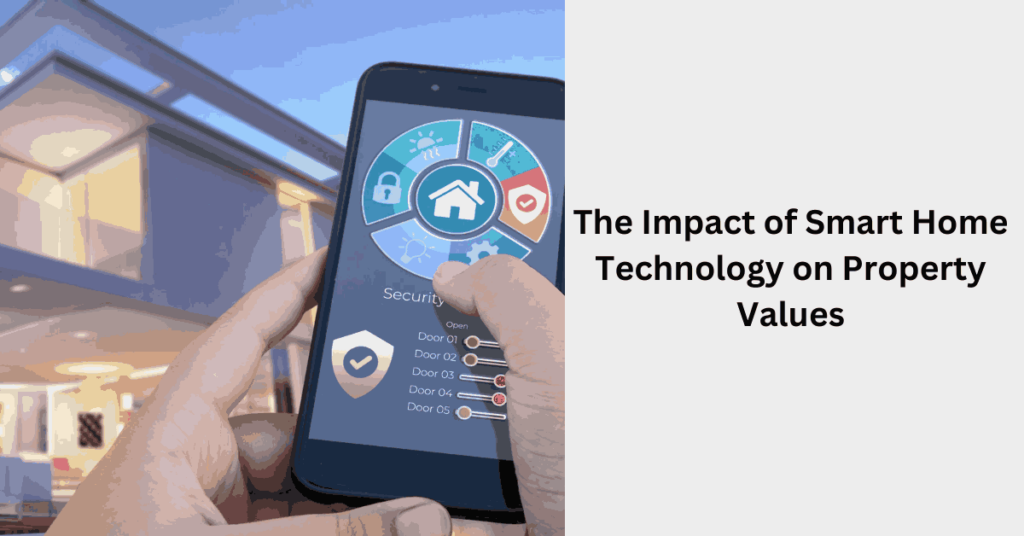The Impact of Smart Home Technology on Property Values

In the era of rapid technological advancement, smart home technology has emerged as a transformative force, reshaping the way we live and interact with our living spaces.
Beyond the convenience and connectivity it offers, smart home technology is also influencing property values.
As homes become more interconnected and technologically advanced, their market appeal and perceived value undergo a significant shift.
Table of Contents
1. Enhanced Convenience and Comfort:
Smart home features, such as automated lighting, thermostats, and security systems, contribute to enhanced convenience and comfort for homeowners.
The ability to control various aspects of the home remotely through smartphones or voice commands adds a layer of sophistication that resonates with modern living expectations.
2. Energy Efficiency and Cost Savings:
Smart home technologies often include energy-efficient solutions like smart thermostats, lighting systems, and appliances. The integration of these features not only reduces energy consumption but also translates into cost savings for homeowners. Prospective buyers are increasingly valuing properties with built-in energy-saving capabilities.
3. Increased Security Measures:
Home security is a top priority for homeowners, and smart home technology provides advanced security measures. From smart locks and doorbell cameras to comprehensive security systems with real-time monitoring, these features enhance the safety of the property. The perceived increase in security positively impacts the property’s value.
4. Integration of Smart Appliances:
Modern homes equipped with smart appliances, such as refrigerators, ovens, and washing machines, appeal to tech-savvy buyers. The automation and connectivity of these appliances not only streamline daily tasks but also contribute to the overall modernity and efficiency of the home.
5. Home Automation Systems:
Comprehensive home automation systems that centralize control over various aspects of the home, including lighting, climate, and entertainment systems, are becoming more prevalent. The seamless integration of these systems adds a layer of sophistication and modernity that can elevate a property’s perceived value.
6. Market Competitiveness:
As the adoption of smart home technology becomes more widespread, homes equipped with these features gain a competitive edge in the real estate market. In a tech-driven world, properties that align with the expectations of modern buyers are more likely to stand out and command higher market values.
7. Appeal to Tech-Savvy Buyers:
The younger generation of homebuyers, often characterized by a strong affinity for technology, places significant value on smart home features. Properties that cater to the preferences of tech-savvy individuals are likely to attract a larger pool of interested buyers, potentially driving up property values.
8. Future-Proofing Investments:
Investing in smart home technology is a form of future-proofing a property. As these technologies continue to evolve and become more integral to daily life, homes equipped with the latest advancements are likely to maintain their appeal and value over time.
9. Customization and Personalization:
Smart home technology allows for a high degree of customization to suit individual preferences. Whether it’s setting personalized lighting scenes or automating specific routines, the ability to tailor the home environment contributes to a sense of personalization that resonates with buyers seeking a unique and modern living experience.
10. Data-Driven Home Insights:
Smart home devices often generate valuable data about the property, including energy usage patterns, security insights, and more. This data-driven approach to homeownership provides additional insights for both current and prospective homeowners, adding an analytical dimension that contributes to the property’s perceived value.
Conclusion:
The impact of smart home technology on property values extends beyond mere gadgetry; it reflects a fundamental shift in the way we envision and experience home living. As homes become more connected, efficient, and secure, the market dynamics are changing.
Buyers are increasingly recognizing the value of smart features, and properties equipped with these technologies are well-positioned to command higher market values.
In an ever-evolving technological landscape, the integration of smart home technology is not just a trend; it’s a strategic investment that adds a new layer of value to the concept of home.
